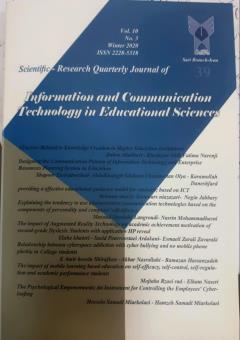Examining the Elements of Mooc-based Curriculum in Iran's Higher Education (Case study: Islamic Azad University of Golestan Province)
Subject Areas :elham shariati 1 , لادن سلیمی 2
1 - Islamic Azad university
2 -
Keywords: Curriculum, Curriculum Elements, Mooc-Based Courses, Higher Education.,
Abstract :
The present applied research was conducted with the aim of investigating the elements of the Mock-based curriculum in higher education with a mixed approach (qualitative and quantitative). The professors and curriculum experts were selected as the statistical population of the qualitative section with the purposeful sampling method and the theoretical saturation technique in the number of 13 people. In the quantitative section, 375 students were selected as the statistical population using a multi-stage relative cluster sampling method.Semi-structured interviews were used in the qualitative part and questionnaires were used in the quantitative part to collect data. Qualitative data analysis was based on inductive qualitative content analysis, and quantitative data analysis was based on confirmatory factor analysis and regression. In the results of this research, the elements of the Bermuk-based curriculum in higher education included 22 main categories and 108 subcategories. The findings of the research showed that the components have the necessary qualitative and quantitative validity, and also the evaluation of the curriculum based on Bermuk is more effective than other elements.
References
Abedini Baltork, M., Salehi Amran, I., & Kolbadinezhad, N. (2023). Feasibility Study of a MOOC-Based Curriculum in Higher Education. Maritime Education. https://doi.org/10.22034/rmt.2023.543737.2034
Balfour, S. P. (2013). Assessing writing in MOOCs: Automated essay scoring and calibrated peer review. Research & Practice in Assessment, 8(1), 40-48.
Boromand, M. (2016). Investigating the Job Competencies of Physical Education and Sports Science Students at Public Universities in Tehran (Master's thesis). Shahid Beheshti University.
Chen, Y. (2014). Investigating MOOCs through blog mining. International Review of Research in Open and Distance Learning Journal, 15(2), 85-106.
Dorotaj, F., & Rajabian Dehzireh, M. (2018). The Impact of MOOC-Based Distance Education on Academic Engagement and Its Components in Payame Noor University Students. Cognitive Strategies in Learning, 6(9), 131-150. https://doi.org/10.22034/rmt.2023.543737.2034
Gholampour, M., Rostamian Nejad, M. A., & Poorshafaie, H. (2019). Identification of Key Success Factors of MOOC Courses: A Synthesis Study Based on the Roberts Model. Curriculum Research Quarterly, 9(2), 139-162. https://doi.org/10.22034/rmt.2023.543737.2034
Goldberg, L. R., Bell, E., King, C., O’Mara, C., McInerney, F., Robinson, A. & Vickers, J. (2015). Relationship between participants’ level of education and engagement in their completion of the understanding dementia massive open online course. BMC Medical Education Journal, 15(1), 1-7.
Jafari, E., Fathi va Ajaregah, K., Aarafi, M., & Rezaeezadeh, M. (2017). Validation of MOOC-Based Curriculum in Higher Education. Journal of Information and Communication Technology in Educational Sciences, 8(29), 161-180.
Jafari, E., Fathi Vajaregah, K., Aarafi, M., & Rezaeezadeh, M. (2019). Developing a Model for MOOC-Based Curriculum in Higher Education Using Grounded Theory (Case Study: Higher Education in Iran). Journal of Educational Technology, 13(3), 581-593.
Jones, M. E. O. (2020). The Trouble With Cyberpragmatics: Embedding an Online Intercultural Learning Project Into the Curriculum: Education Book.
Karami, Z., Saraji, F., & Maroofi, Y. (2018). Narrative Curriculum and Professional Development of Teacher Students. Theory and Practice in Curriculum Studies, 5(9), 69-104.
Khalid, B., Chaveesuk, S., & Chayasoonthorn (2021). MOOCs adoption in higher education: A management perspective. Polish Journal of Management Studies, 23(1), 239-256.
Louw, A. (2019). Curriculum Planning in Schools (Foundations of Curriculum Planning). Translated by F. Mashayekh. Borhan Cultural Institute.
Malaki, S. (2020). Design and Validation of a MOOC-Based Learning Readiness Questionnaire. Master's Thesis in Educational Technology, Kharazmi University.
Mazbouhi, S., & Talafi Dariani, F. (2021). The Impact of MOOC on Learning and Memorization of the Quran Course. Educational Psychology, 17(59), 123-405.
Mehdavi Hezaveh, M., Mehrmohammadi, M., Abbaspour, A. (2016). A Comparative Study of Competency-Based Curriculum in the Primary Teacher Education Programs in Malaysia, India, and Iran. Curriculum Studies, 41, 23-64.
Pourghaz, S., Tomaj, A., & Gholami, K. (2020). The Effect of MOOC-Based Training on Academic Adaptation of Students with Attention Deficit/Hyperactivity Disorder (ADHD). Information and Communication Technology in Educational Sciences, 10(40), 67-87. https://doi.org/10.22034/rmt.2023.543737.2034
Rezaei, E., Zolfaghari, M., & Hoshmandja, M. (2023). A Competency-Based Curriculum Model in the Development of an Educational Technology Doctoral Program in Medical Sciences. Iranian Journal of Medical Education, 22, 120-132.
Samian, M., Mohaddi, R., Saadi, H., & Salehi Amran, I. (2020). The Competency Model of Agricultural Students from the Perspective of Experts. Agricultural Education Management, 55, 137-156.
Shamshirgaran, F., Afkari, F., & Ahmadi, G. (2019). Designing a Virtual Curriculum for the First Grade Science Course. Information and Communication Technology in Educational Sciences, 10(2), 153-171.
Stracke, C. M., & Trisolini, G. (2021). A Systematic Literature Review on the Quality of MOOCs. Sustainability,13(11).

